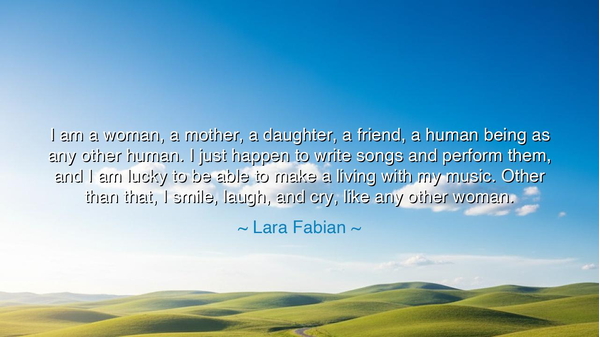
I am a woman, a mother, a daughter, a friend, a human being as
I am a woman, a mother, a daughter, a friend, a human being as any other human. I just happen to write songs and perform them, and I am lucky to be able to make a living with my music. Other than that, I smile, laugh, and cry, like any other woman.






In the realm where song meets soul, the voice of Lara Fabian rises not only in melody but also in truth, as she declares: “I am a woman, a mother, a daughter, a friend, a human being as any other human. I just happen to write songs and perform them, and I am lucky to be able to make a living with my music. Other than that, I smile, laugh, and cry, like any other woman.” These words, simple and humble, carry with them the wisdom of identity, equality, and humanity. They remind us that behind the stage lights and the acclaim lies the same beating heart that dwells in us all.
For she begins with what is most elemental: “I am a woman.” In this declaration, there is both pride and universality. She claims not the title of star or goddess, but the role of daughter of humanity, bound by the same joys and sorrows as every other. By placing herself first in the circle of relationships—mother, daughter, friend—she teaches that what defines us is not our fame or labor, but the bonds of love, duty, and companionship. The crown of humanity is not celebrity, but connection.
And yet, Lara Fabian acknowledges the gift of her music. She does not deny the uniqueness of her craft; she admits she is fortunate to make a living by it. But she does not allow this to raise her above others. Her voice, her art, is but one way of being in the world. The essence of her life is not the stage but the shared experiences of all mortals: to smile, laugh, and cry. In these words, she places herself shoulder to shoulder with every woman, every man, and every child, stripping away the illusion that fame makes one more than human.
The ancients also honored this truth. Consider the tale of Marcus Aurelius, emperor of Rome, who ruled the known world yet wrote in his meditations: “I am a man like any other. The purple robe does not make me more than flesh and spirit.” Just as Lara Fabian sets aside the titles of artist and performer to rest in her humanity, so too did Aurelius remind himself that emperorship was but a role, while humanity was the essence. Greatness, he taught, lies in remembering that all are equal in laughter, in sorrow, in death.
We can see this truth in the life of Mother Teresa. Though revered across the world, she insisted always that she was only a small woman serving a great God, that her acts of love—feeding, caring, smiling, weeping with the poor—were no different than what every human was called to do. Like Fabian, she brushed aside the titles, the honors, the grandeur, and returned always to the truth of shared humanity. To smile, laugh, and cry was her measure of kinship with the world.
The lesson here is profound: never forget the common threads that bind us to one another. Titles, talents, and triumphs may distinguish us for a time, but they do not separate us from the essence of being human. To be a friend, to be a parent, to be a child, to weep and rejoice—these are the true measures of life. Fabian’s humility teaches us to cherish our humanity above our achievements, and to find dignity not in standing apart, but in standing together.
So let her words endure: “I smile, laugh, and cry, like any other woman.” Carry this with you as a shield against pride and as a compass of compassion. Treat each person not by their title or station, but as one who shares your humanity. And in your own life, honor your bonds as mother, father, child, and friend, for these are the roles that outlast the fleeting glories of the world. Fame passes, wealth fades, but the humanity of shared joy and shared sorrow abides forever.






AAdministratorAdministrator
Welcome, honored guests. Please leave a comment, we will respond soon